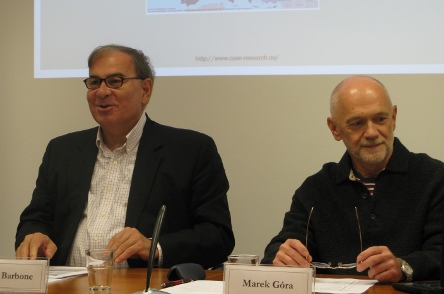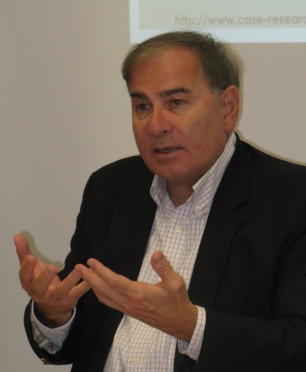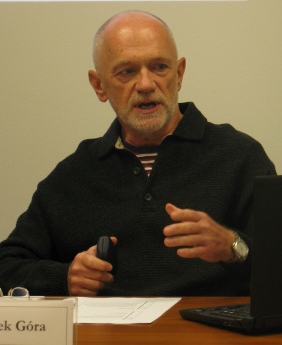Migration from the EaP countries discussed during the CASE Policy Seminar
 On September 23rd, 2013, CASE hosted the seminar “Migration from the Eastern Partnership Countries (Armenia, Azerbaijan, Belarus, Georgia, Moldova, Ukraine): Prospects for the European Union”, organized within the scope of the recently completed project “ENPI - Costs and Benefits of Labour Mobility between the EU and the Eastern Partnership Partner Countries”.
On September 23rd, 2013, CASE hosted the seminar “Migration from the Eastern Partnership Countries (Armenia, Azerbaijan, Belarus, Georgia, Moldova, Ukraine): Prospects for the European Union”, organized within the scope of the recently completed project “ENPI - Costs and Benefits of Labour Mobility between the EU and the Eastern Partnership Partner Countries”.
CASE President Luca Barbone provided a general overview of the migration trends from the EaP countries and presented the characteristics of the historical stages of migration. He pointed out the differences among the migration phenomena in the EaP countries, which cannot be approached in the same way and, thus, need specially-designed policies. 
In terms of costs and benefits, he argued that migration in the EaP countries generates large benefits for both migrants and their families and for economic and social development in migrants’ home countries. However, he cautioned that one cannot forget about the weaknesses of the process, which include a lack of protection of migrants’ rights and a lack of access to social benefits. Nevertheless, the study conducted within the project concludes that both costs and benefits can be changed by adopting specific policies and strengthening the institutions dealing with migration.
 In his presentation, Marek Góra focused on the case of Poland as an interesting example of a country that remains both a sender and a recipient of migrants. He gave an overview of the Polish situation, focusing on its attractiveness for migrants from the EaP countries, which stems from their similar histories, cultures and languages.
In his presentation, Marek Góra focused on the case of Poland as an interesting example of a country that remains both a sender and a recipient of migrants. He gave an overview of the Polish situation, focusing on its attractiveness for migrants from the EaP countries, which stems from their similar histories, cultures and languages.
Although Prof. Góra also pointed to the possible negative effects of migration, he mainly stressed the fact that immigration is a positive phenomenon and that migrants contribute to Poland’s prosperity and foster better relations with the country’s neighbors. With a growing number of immigrants, however, Poland needs to maintain a migrant-friendly policy, focusing on strengthening the institutions responsible for their integration into Polish society.
For more information on the project click here.

